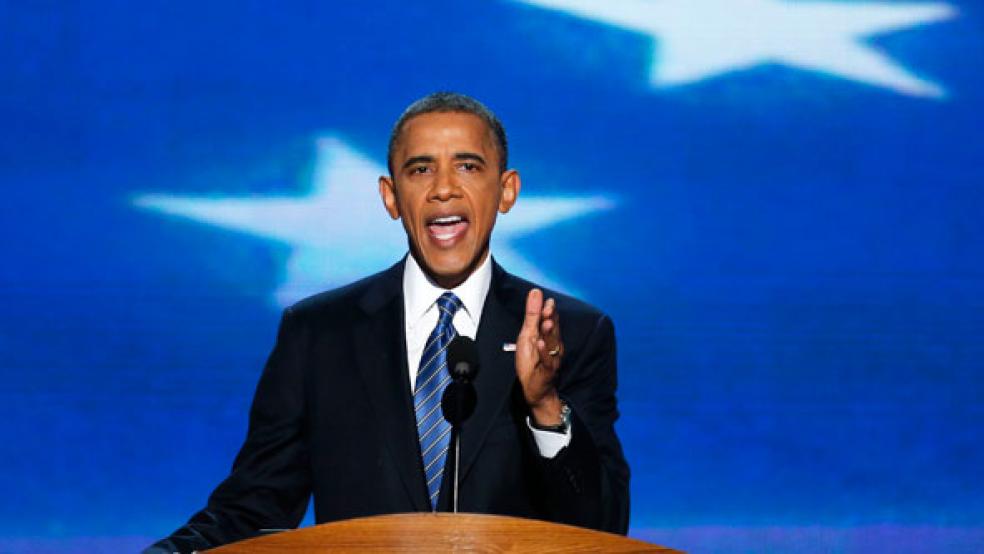President Obama preached the virtue of patience to the Democratic faithful on Thursday night, emphasizing the magnitude of an economic catastrophe that—in sharp contrast to Republican Mitt Romney—cannot be solved by tax cuts alone.

Gone was the heady ambition that initially swept him into the White House. No mention was made of early predictions by the administration of the deficit being halved in four years and unemployment never breaching 8 percent because of an $800 billion stimulus. Obama, instead, asked for more time.
“It will take more than a few years for us to solve challenges that have built up over decades,” Obama said at the Democratic National Convention in Charlotte. “It will require common effort, shared responsibility, and the kind of bold, persistent experimentation that Franklin Roosevelt pursued during the only crisis worse than this one.”
Cognizant of the burdens attached to the presidency, Obama made the evening about the voters who first elevated him to the highest office in the land. Rather than dwell on the economy, he attacked his opponent—mentioned by name just once—and spoke of a future based on manufacturing, education, domestic energy sources, and returning the federal government to a financially viable path.
“I'm no longer just a candidate--I'm the president,” he declared. “I'm far more mindful of my own failings … But as I stand here tonight, I have never been more hopeful about America. Not because I think I have all the answers. Not because I'm naïve about the magnitude of our challenges. I'm hopeful because of you.”
The word “you” appeared 86 times in the speech. And while Romney frames the election as a referendum on the past four years, Obama is striving to make it a competition of ideas over the next four.
For many Americans, the recovery from the 2008 financial meltdown has been so slow that it might as well be a standstill. Unemployment remains two percentage points above the historical average at more than 8 percent, while deficits have inflated the national debt to $16 trillion—equal in size to the annual gross domestic product.
Take home pay has on average only increased because of emergency tax breaks, and after adjusting for inflation droops slightly lower than what it was back in 2007, according to the Bureau of Economic Analysis. The pollster Gallup found that daily spending by households making less than $90,000 a year—most of the country—increased a mere $2 over the past four years to $59 a day.
Romney hammered Obama last week in his acceptance speech in Tampa, drubbing the president as a good man who was out of his depth. "The president hasn't disappointed you because he wanted to," Romney said.
"He took office without the basic qualification that most Americans have and one that was essential to his task. He had almost no experience working in a business. Jobs to him are about government."
But Obama and Vice President Joe Biden last night turned the tables on Romney, calling him and his running mate Paul Ryan unprepared to lead on national security and foreign policy, and bent on domestic policies that would shred the social safety net while showering major tax cuts on wealthy Americans.
It’s a familiar theme from their stump speeches: Republicans as plutocrats, clueless to the plight of the middle class while pursuing devastating overhauls of Medicare and Medicaid and hiding just how they would prevent their tax cuts from pumping up the deficit. In a dig at Romney’s private equity background, Biden snidely labeled it "the Bain way.”
"They want your vote but they don't want you to know their plan,” Obama said. “And that's because all they had to offer is the same prescriptions they’ve had for the last 30 years: Have a surplus, try a tax cut. Deficit too high? Try another. Feel a cold coming on? Take two tax cuts, roll back some regulations, and call us in the morning."
Their criticism predictably targeted the opposition by Romney, the son of a former Michigan governor and automobile CEO, to the government bailout of General Motors and Chrysler, which salvaged assembly line jobs in Michigan, Ohio and other battleground states. Both also took aim at Romney for failing to recognize the sacrifices of the U.S. military in Afghanistan and Iraq during his acceptance speech at the GOP convention.
Just as Romney’s speech last week skimped on policy details, so did Obama’s. He would add one million manufacturing jobs by the end of 2016, reduce oil imports, create 600,000 jobs in the natural gas industry, hire 100,000 new math and science teachers, and institute new controls on the rising cost of college tuition.
The goal of a million new factory jobs, for example, seems less impressive if you consider that the addition would still leave manufacturing employment about 400,000 workers below its level in 2008.
But he brought the convention to its feet with a stirring paean to middle class values and the need for Americans to pull together and help him finish what he started over the next four years. "If you turn away now and if you buy into the cynicism, that the change we fought for is impossible, well change will not happen," he said.
"Only you can make sure that doesn't happen," he concluded. "Only you have the power to move us forward."





